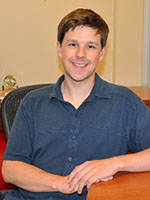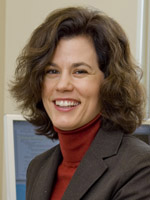Gleich, Neville, and Tricoche Receive NSF CAREER Awards
03-02-2012
Congratulations to Computer Science faculty members David Gleich, Jennifer Neville, and Xavier Tricoche on receiving CAREER Awards from the National Science Foundation!
According to the NSF, "The Faculty Early Career Development (CAREER) Program is a Foundation-wide activity that offers the National Science Foundation's most prestigious awards in support of junior faculty who exemplify the role of teacher-scholars through outstanding research, excellent education and the integration of education and research within the context of the mission of their organizations. Such activities should build a firm foundation for a lifetime of leadership in integrating education and research."

Assistant Professor David Gleich joined the Department in Fall 2011. The project proposal that earned him the CAREER Award is titled "Modern Numerical Matrix Methods for Network and Graph Computations."
Gleich describes that this project "will study a new class of algorithms to compute nonlinear functions of matrices, such as the matrix exponential. The matrix exponential has many uses; for example, it underlies many new computations designed to identify the most important relationships in neural networks. Standard techniques for the matrix exponential involve examining all of the connections at each step (and there could be hundreds or thousands of steps), only to highlight a few pieces of information. A more recent paradigm, called local computations, only utilizes the connections from a few entities (in the matrix, they only look at a few rows or columns) at a time. The goal of this research is to design new algorithms for the matrix exponential and other functions of matrices in the local computations paradigm. These new algorithms will be able to operate on the world's largest networks quickly (ideally in seconds or minutes), and help application specialists study their data in new ways. Three driving applications will be ranking and voting, link prediction, and brain networks. The investigation will also include the study of higher-order connections in networks that give rise to three or four dimensional matrices -- commonly called tensors."
A complete abstract for Gleich's award-winning project is available here.

Assistant Professor Jennifer Neville has been with the Department since Fall 2006. Her project "Machine Learning Methods and Statistical Analysis Tools for Single Network Domains" was her CAREER Award-winning proposal.
Neville explains that this project "focuses on the development of robust statistical methods for single network domains---since many large network datasets about complex systems rarely have more than a few subnetworks available for model estimation and evaluation. Specifically, the aims of the project include (1) strengthening the theoretical foundation for learning in single network domains, (2) creating accurate methods for determining the significance of discovered patterns and features, (3) formulating novel model selection and evaluation methods, and (4) developing improved approaches for network learning and prediction based on the unique characteristics of single network domains. The research will enhance our understanding of the mechanisms that influence the performance of network analysis methods and drive the development novel methods for complex network domains. Expanding the applicability of machine learning techniques for single network domains could have a transformational impact across a broad range of areas (e.g., psychology, communications, education, political science) where current methods limit research to the investigation of processes in dyad or small group settings. Also, the project results will serve as an example application of computer science in broader network science context, which will attract and retain students that might not otherwise be engaged by conventional CS topics."
A complete abstract for Neville's award-winning project is available here.
Assistant Professor Xavier Tricoche first started with the Department in Fall 2007. His project proposal "Efficient Structural Analysis of Multivariate Fields for Scalable Visualization" earned him the CAREER Award.
Of this project, Tricoche notes, "The PI will address the limitations of the current state of the art by pioneering a comprehensive approach for the efficient visual analysis of large-scale datasets. Central to the proposed approach is a novel definition of geometric saliency that will permit the automatic identification of remarkable manifolds in scientific data. To that end, the PI will unify and subsume a variety of concepts from mathematics and computer vision to create a principled and versatile model for the structural analysis and visual representation of multifield problems. Innovative data structures and sparse sampling strategies leveraging parallel architectures will be devised to enable the efficient processing of large and multivariate datasets at scale. Lastly, these computational foundations will power a user-centric visual analysis framework that the PI will assess in the context of multidisciplinary collaborations spanning fluid dynamics, materials engineering, high-energy physics, and cardiovascular research. This research effort will benefit the scientific community by contributing a rigorous and scalable framework for the effective analysis and visualization of computational or measured datasets across a broad range of scientific problems."
A complete abstract for Tricoche's award-winning project is available here.